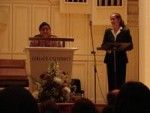Understanding Humanity: Nobel Peace Prize Laureate Rigoberta Menchu Teaches a Lesson on Social and Economic Poverty

Nobel Peace Prize Laureate Rigoberta Menchu, introduced by the Latin American Student Organization (LASO), came to speak at Colgate University last Thursday. As a witness to tragedy in Guatemala, but an optimist for the future, Menchu left listeners with the message to become active in the social, religious and economic poverty in this world.
Aiming to foster a greater understanding of Latin American culture, faculty, students and LASO welcomed Menchu, a native Mayan from Guatemala.
“Rigoberta Menchu is an activist of the culture of Gautemala. She has given voice to the voiceless and is the living testimony for social justice,” Professor of Romance Languages and Literatures Lourdes Rojas said.
With Assistant Professor of Spanish Aida Diaz de Leon as translator from Spanish to English, Menchu began with a detailed description of her spiritual beliefs and experiences as a Mayan native.
Describing how people suffering from terminal diseases such as cancer came to her needing to be heard and supported, Menchu emphasized the importance of spirituality as an energy source, emotionally and physically.
“I always tell them to be the light in another person’s life,” Menchu said.
Exiled from Guatemala at the age of 25 and witnessing the death of her own relatives in the genocide that occurred in Guatemala, Menchu said that despite every individual’s hardships and personal obstacles, the best way to solve one’s own problems is to solve the problems of others.
“I have come to the understanding that humanity is deteriorating more and more,” Menchu said, reflecting on her personal tragedy, “but what is most needed is hope.”
Using as an analogy the way that the racist and the alcoholic deny their own problems, Menchu revealed her belief that the daily suffering, violence and disaster afflicting humanity is the result of a diminishing connection with the spiritual.
Despite the worsening condition of humanity, Menchu’s speech included inspirational ideas for the future.
“I come to inspire students to be creative,” Menchu said.
Believing that everyone has a lesson to teach and the ability to listen, Menchu stressed the need for awareness, creative leadership and action. The need for energy and light in a world that is losing its spirituality and becoming increasingly weighed down by disease, crime and other troubles is a common social obligation, Menchu said.
Ending on an optimistic note for the future, the audience responded with great enthusiasm.
Many students, excited about the opportunity of speaking Spanish with a native Guatemalan, asked questions about the significance of her books and her childhood experiences as a Mayan.
“I am thankful for LASO providing this wonderful opportunity to listen to Menchu speak about the Mayan culture in terms of the Mayan calendar, spirits and energies. By emphasizing the importance of the spiritual aspect of life, but avoiding the position of a priest, her message was extremely powerful,” sophomore Jana Bauerova said.
Though it was noted that students who could not understand Spanish did not find the speech as moving or inspirational as students who understood Menchu without a translator, those who did not directly depend on English enjoyed the charm and beauty of the Spanish language in Menchu’s advice for the future.
“What I liked was the fact that, instead of focusing on the atrocities of the past, which we had expected her to speak about, she spoke about what was necessary to ensure a brighter and stronger future,” first-year Giselle Winchester said. “That she could be so compassionate and optimistic after all that she, her family and her country have endured was incredibly moving. On the whole, I think that her speech was very inspirational and encouraging for students. I think she gave good advice to motivate us to be proactive, involved and creative.”



